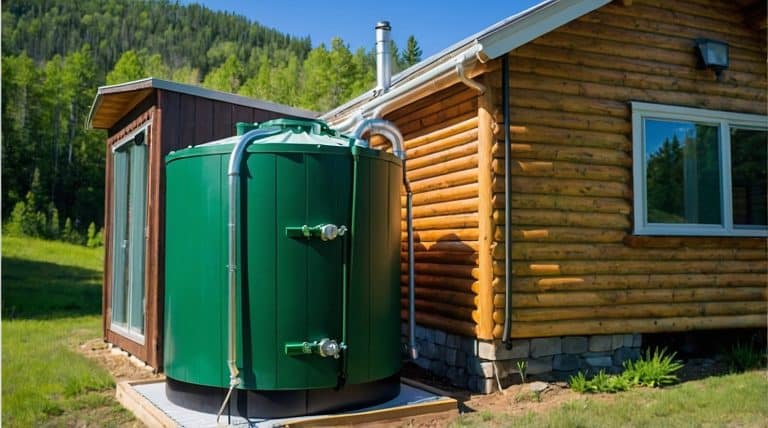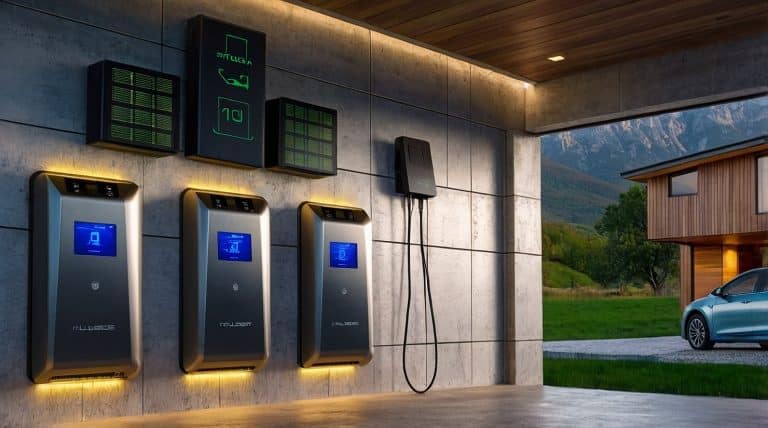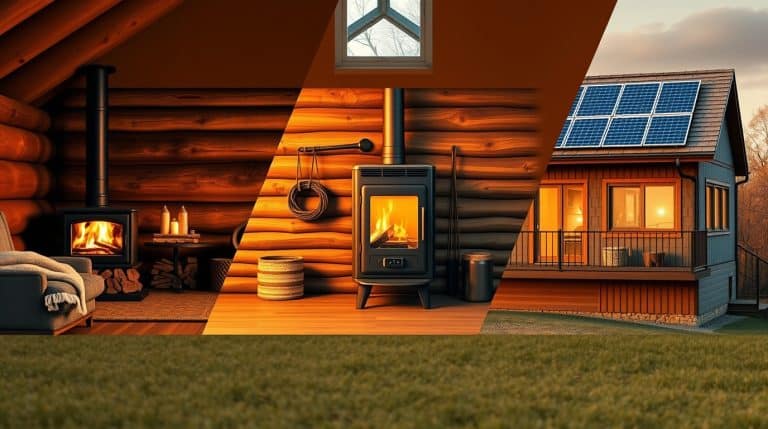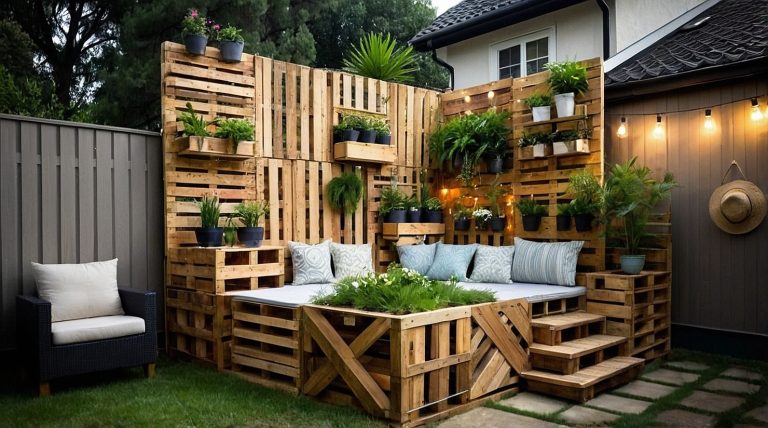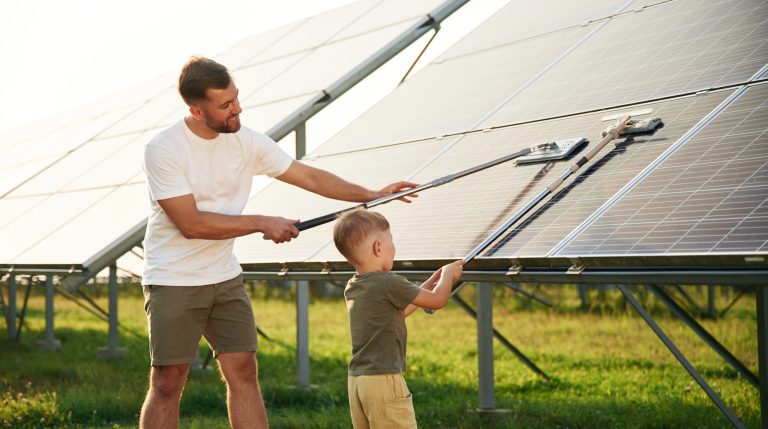The Top 5 Best Off Grid Power Systems For Off Grid Living
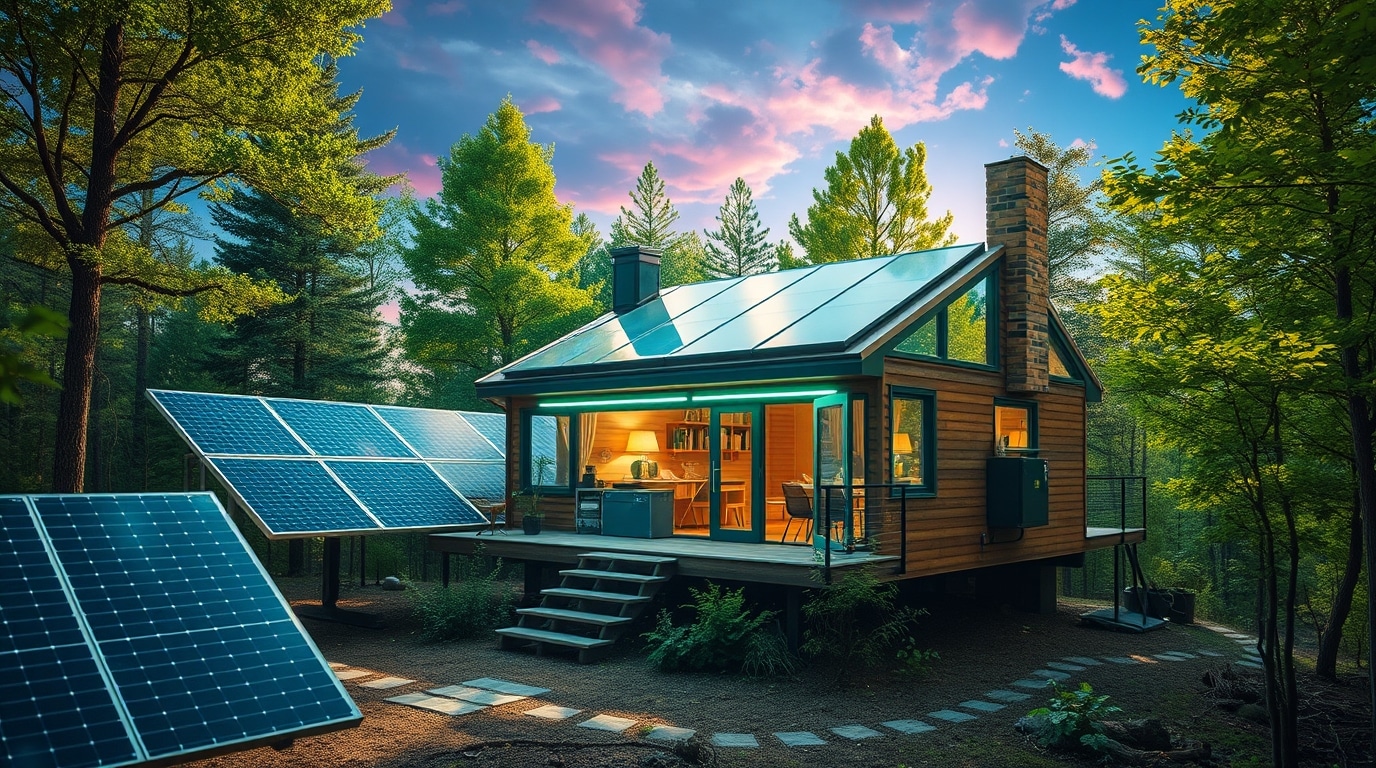
Imagine a life untethered from the electrical grid, where your home or business is powered solely by the sun, wind, or earth – a dream shared by those committed to a greener future. Selecting the best off grid power systems requires careful planning and a clear understanding of your energy needs.
Forget the basics—we’re about to reveal the secret to truly exceptional off-grid power systems. Without the grid, you can still live comfortably and resiliently, no sweat. Your journey to finding the ideal off-grid power system for your needs starts right here.
Table Of Contents:
- Key Components of the Best Off Grid Power Systems
- Building the Best Off Grid Power Systems
- 5 Best Off Grid Solar Power Systems
- Fine-Tuning Your Best Off Grid Power Systems
- Wrapping Things Up
- Off the Beaten Path – Supplementary Resources
Key Components of the Best Off Grid Power Systems
The best off grid power systems, whether for a small cabin or a large homestead, rely on these core parts working together seamlessly:
Off-Grid Power Generation With Solar Panels
Solar panels are the most common way to generate electricity off-grid, providing a reliable and sustainable power source. They convert sunlight into direct current (DC) electricity, which can then be stored in batteries or converted to alternating current (AC) for use in homes or businesses.
Determining Your Power Needs
The amount of power you need dictates how many solar panels you’ll require. Pinpoint your power needs by considering things that matter, such as:
- Your location and typical weather patterns.
- The size and type of appliances you’ll be powering.
- The number of people using the electricity.
Ground-Mounted Solar Panels
When you need your home or cabin to be solar powered, ground-mounted solar panels offer several advantages for off-grid living. They are:
- Easier to maintain, with better airflow and simpler cleaning.
- More adaptable to different terrain and installation angles.
- Compatible with tracking systems to capture more sunlight.
Solar Tracking Systems
A dual-axis solar tracker offers another great way to ensure you generate as much electricity as possible with solar. These systems:
- Follow the sun’s movement throughout the day.
- Adjust to seasonal changes in the sun’s angle.
- It can increase energy production by up to 45%.
Portable Solar Panels
Another key advantage of off-grid living is the flexibility and portability offered by the best off grid power systems. Imagine tapping into a constant, renewable energy source, no matter where your adventures take you – that’s precisely what portable solar panels offer, empowering a new wave of off-grid enthusiasts.
- Lightweight and Compact: Ideal for camping, RV trips, and mobile adventures. From cramped city streets to winding country roads, their compact shape lets you take them anywhere the adventure calls.
- Easy to Set Up and Use: With simple plug-and-play connections, you can have power in minutes—no complicated installations required.
- Perfect for Remote Areas and Emergency Power: When you’re far from civilization or facing a power outage, these panels provide a reliable backup energy source.
Consider your specific power needs when choosing the best off grid power systems. The amount of electricity you require will determine the number of solar panels you’ll need and the ideal setup for your location and climate.
Space is no issue with ground-mounted solar panels – they’re perfect for homeowners who want a customized energy solution. They’re easier to clean and maintain than roof-mounted systems, and they can even be equipped with tracking systems to maximize sunlight exposure throughout the day.
Energy harvesters can get a serious lift from a top-notch dual-axis solar tracker – these clever devices follow the sun’s movement to seize every available ray, maximizing sunlight absorption.
With the right blend of portability, efficiency, and smart tracking technology, the best off grid power systems offer a reliable, flexible, and self-sustaining energy solution for those looking to break free from the grid.
Stay charged, stay ready – these systems have your back in a bind, serving up power and reassurance when every second counts.
Energy Storage: Batteries
Batteries store the DC electricity generated by your solar panels. This stored energy allows you to use power at night or on cloudy days.
Small-scale operations can count on lead-acid deep-cycle batteries to store energy reliably and affordably. Lithium-ion batteries are hard to beat when your home system requires extra juice. Their enhanced efficiency leads to substantial improvements in overall performance and battery life.
Lithium batteries offer excellent round-trip efficiency and avoid the sulfation issues common with lead-acid batteries. With these lithium battery energy solutions, backup power just got a whole lot brighter—perfect for many situations.
Power Conversion: Inverters
Most appliances run on alternating current (AC) power. An inverter converts the DC power from your batteries into usable AC.
Inverters are the backbone of off-grid power. A high-quality one will help you sleep better at night, knowing your energy needs are covered. Top-tier off-grid inverters are designed for continuous and surge loads.
These inverters convert power and expertly manage input from diverse sources. Avoid skimping on the inverter—choose one with a larger load capacity to support your needs.
Having higher kilowatt off-grid inverters for your inverters for power stations is beneficial so that it does not fail you when powering your homes. There are various power options to choose from depending on how large the power system is.
System Management: Charge Controllers
Charge controllers regulate the flow of energy between solar panels and batteries. Overcharging can be a real concern, but with these advanced chargers, you can breathe easily—they’re built to protect your batteries.
A charge controller is the missing link between your solar kit and peak energy production. By regulating the flow, you can sleep soundly, knowing you’re extracting maximum power.
Building the Best Off Grid Power Systems
Building the best off grid power systems involves more than just choosing high-quality components. Proper planning and calculations are essential:
Load Calculation
A load calculation determines your total power consumption. The efficiency of your solar energy system relies on the perfect balance between your panel and battery sizes—it’s a make-or-break factor in overall performance. Include everything you’ll run off-grid: lights, appliances, tools, and other essential equipment.
Consider your peak power usage, which determines the necessary inverter capacity. Pushing your system to the limit, whether with solar power or multiple energy-intensive tasks running simultaneously, can quickly become overwhelming.
System Sizing
Correctly sizing your system requires using a load calculator to ensure all components align with your energy needs. A well-sized system reliably powers essential devices and accommodates future upgrades.
A 7-9kW solar system with a 12kWh battery and a 4-5kW inverter is often sufficient for smaller homes or cabins. However, larger homes with more appliances may require a 15kW solar system, a 24kWh battery, and a larger inverter to accommodate modern living. The kW solar needed depends on how you want the homes to run.
5 Best Off Grid Solar Power Systems
When it comes to true energy independence, choosing the right power system is essential. Whether you’re camping, glamping, or living off the land, whatever your style, we’ve rounded up the best energy solutions to match your needs and keep you connected to the great outdoors. Look no further than these best off grid power systems.
Goal Zero Portable Power Solutions
Renowned for their reliability, portability, and innovative design. Outfit your next adventure with their dynamic duo of solar panels and power stations – lightweight, portable, and perfect for backup power when the grid lets you down.
Goal Zero’s lineup of portable power solutions can handle just about any off-grid energy challenge you throw at them. Before you decide, get the lowdown on the ins and outs of these off-grid systems – we’ll break down the major selling points, the benefits, and the potential drawbacks.
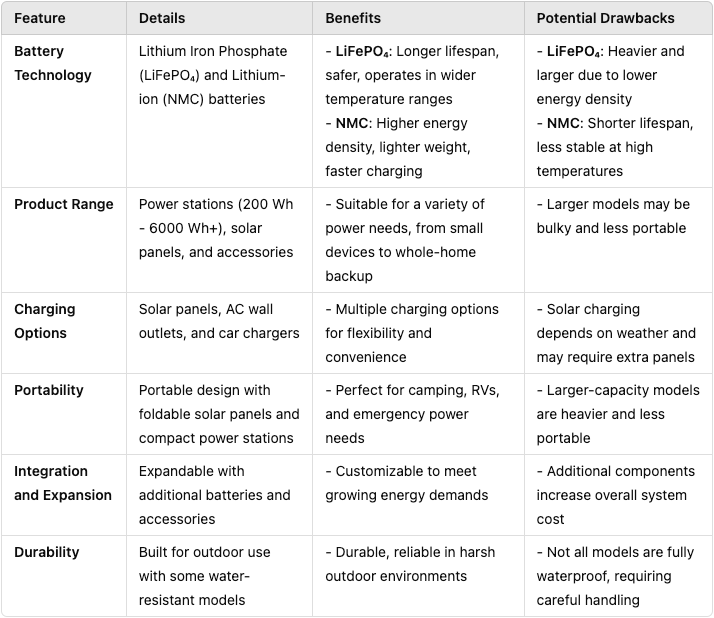 This chart highlights Goal Zero’s offerings’ key features, benefits, and potential drawbacks.
This chart highlights Goal Zero’s offerings’ key features, benefits, and potential drawbacks.
Explorers and outdoor enthusiasts note that Goal Zero’s portable power solutions offer a smart, reliable way to harness the power you need wherever adventure takes you. What works for someone else might not work for you, so take stock of your specific requirements.
EcoFlow Power Kits
EcoFlow’s Power Kits are modular, all-in-one energy solutions that simplify off-grid power systems for RVs, tiny homes, and remote living. These kits combine essential components — like an integrated Power Hub, stackable LFP batteries, and a Smart Distribution Panel — into a plug-and-play system that’s easy to install and customize.
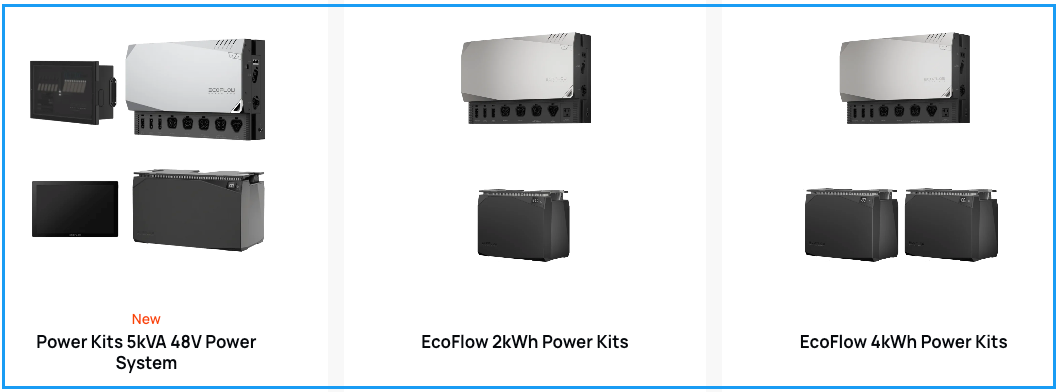
EcoFlow’s Power Kits offer unmatched flexibility and energy independence, with multiple charging options (solar, shore power, vehicle alternator, and EcoFlow’s Smart Generator).
Their user-friendly design allows for seamless DIY installation, making them a top choice for those seeking the best off grid power systems for both mobility and stationary living.
Here’s a breakdown of their key features, benefits, and potential drawbacks:
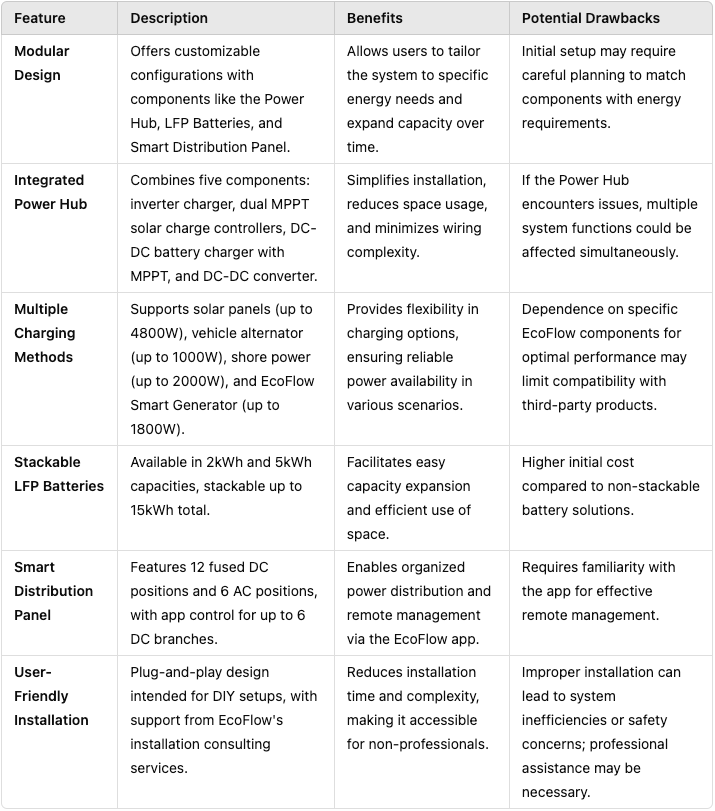
Overall, EcoFlow’s Power Kits offer a comprehensive and flexible solution for off-grid energy needs, focusing on simplicity and scalability. However, users should consider the initial investment and ensure proper installation to leverage the system’s capabilities fully.
Jackery Portable Power Stations
Jackery’s portable power stations are among the best off grid power systems. They offer a dependable, eco-friendly, and versatile energy solution.
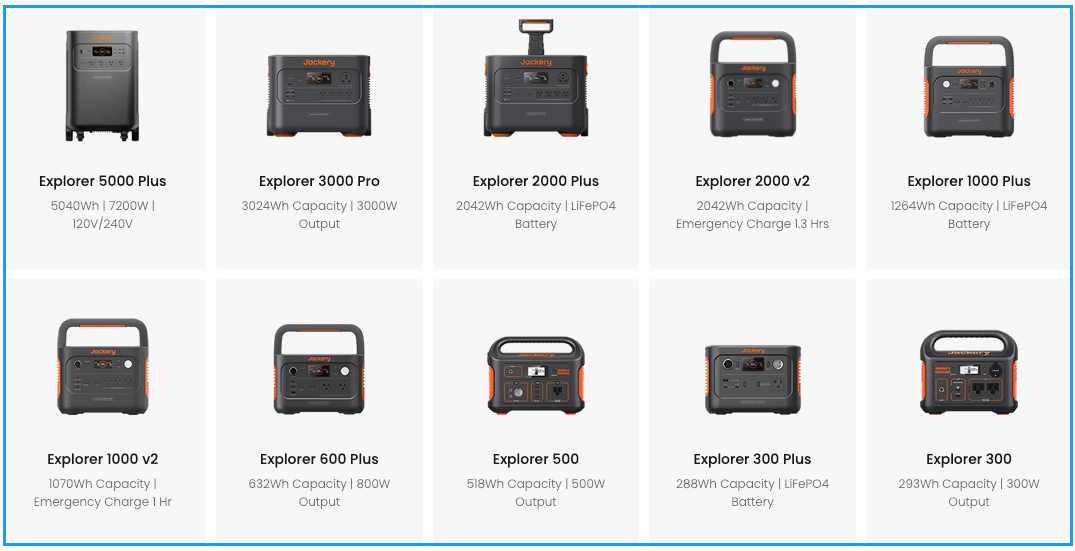
Designed for portability and user convenience, these power stations come in various sizes and capacities to suit everything from camping trips and RV excursions to emergency home backup power.
With options for AC, DC, and USB charging, Jackery delivers a complete off-grid power system that ensures reliable energy whenever and wherever you need it. Their plug-and-play simplicity and ability to recharge via solar panels make them an ideal choice for adventurers, homeowners, and anyone striving for true energy independence.
Here’s a breakdown of their key features, details, benefits, and potential drawbacks:
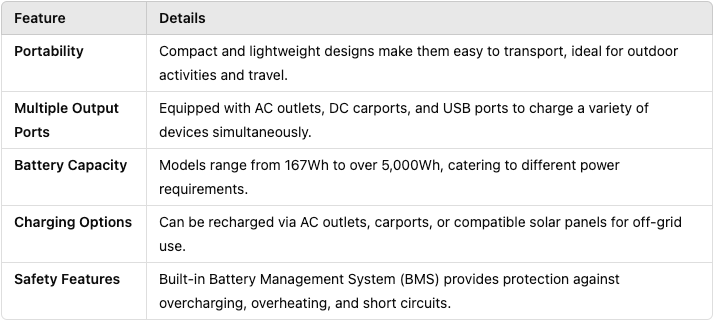
Benefits:
- Versatility: Suitable for charging devices like smartphones, laptops, mini-fridges, and CPAP machines, making them useful in various scenarios.
- Eco-Friendly: Solar-compatible models offer a renewable energy source, which reduces reliance on fossil fuels.
- Quiet Operation: Unlike traditional gas generators, Jackery power stations operate silently, ensuring a peaceful environment.
Potential Drawbacks:
- Limited Capacity for High-Power Devices: Smaller models may not support high-wattage appliances, requiring users to assess their power needs carefully.
- Recharging Time: Solar recharging can be slow and dependent on weather conditions, so it is advisable to have alternative charging methods.
- Cost: Higher-capacity models can be expensive, which may be a consideration for budget-conscious consumers.
Overall, Jackery’s portable power stations provide a convenient and eco-friendly solution for off-grid power needs. However, it is important to select a model that meets your specific energy requirements and budget.
Renogy Solar Kits
Established in 2010, Renogy has become a leading provider of renewable energy solutions, offering some of the best off grid power systems on the market.

Their diverse range of products is designed to facilitate off-grid living, with Power Kits tailored to meet various energy needs—from small cabins to large homesteads—providing reliable and sustainable power options.
Below is a breakdown of the key features, benefits, and potential drawbacks of Renogy’s Power Kits:
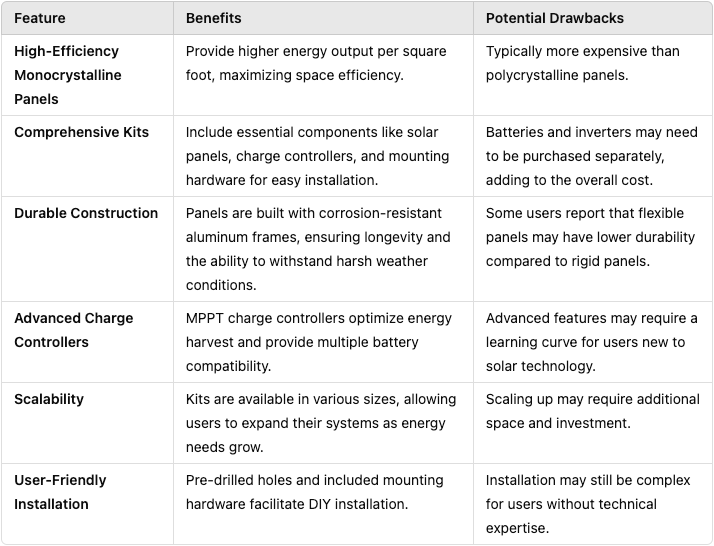
Renogy’s commitment to quality and innovation makes its Power Kits a viable option for those seeking to embrace off-grid energy solutions. However, assessing your specific energy requirements and considering potential additional costs is essential to ensure the chosen system aligns with your needs.
SunGold Power Solar Kit Systems
SunGold Power offers comprehensive off-grid solar kits designed to deliver efficient, reliable, and sustainable energy solutions. Their kits are suitable for various off-grid energy needs, from small cabins to large homesteads.
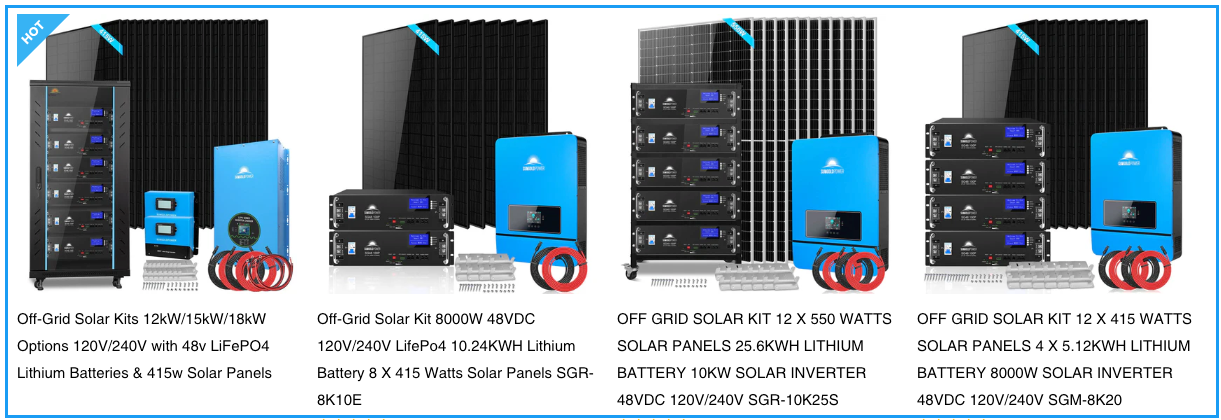
Built with high-quality components like monocrystalline solar panels and LiFePO4 lithium batteries, SunGold Power systems ensure durability, long-term performance, and energy independence.
These all-in-one kits make it easy for users to achieve off-grid living, whether for residential use, RVs, or emergency backup power. With a range of system sizes and user-friendly designs, SunGold Power is a top contender for those looking for the best off grid power systems.
SunGold Power Solar Kit Systems: Key Features, Benefits, and Potential Drawbacks
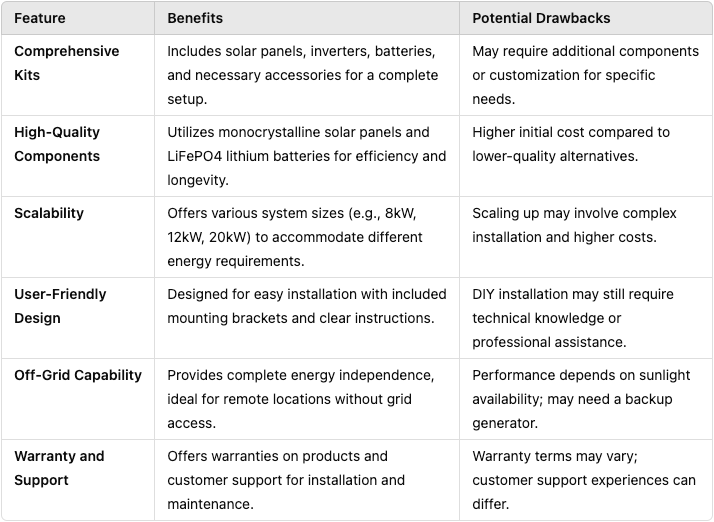
SunGold Power’s solar kits are tailored to meet diverse energy needs, providing a reliable and sustainable solution for those seeking off-grid power independence.
Fine-Tuning Your Best Off Grid Power Systems
Regular system assessments are essential for maximizing the efficiency and reliability of your best off grid power systems. Start by monitoring energy production and usage to identify patterns and spot potential inefficiencies. Upgrading to smart inverters and battery management systems can help automate this process, providing real-time insights and alerts.
For those using a DIY off-grid setup, it’s wise to periodically review your system layout and adjust it as needed to enhance energy flow. Finally, consider adding a backup generator to ensure power availability during extended cloudy periods or unexpected system failures.
By following these steps, you can achieve a more efficient, reliable, and cost-effective off-grid energy solution. Here are a few more things you can do to optimize your off-grid power system:
Energy Efficiency
Energy efficiency is vital for off-grid living. While LED lighting is a great start, consider energy-efficient appliances as well.
Prioritize Energy Star-rated appliances or those exceeding those standards. Regarding energy, take two crucial steps: upgrade your insulation to keep the warmth in and switch to lighting that uses electricity sparingly.
This ensures your off-grid solar, wind, or hydro-power supplies are not overtaxed. Proper lighting and appliances are an energy solution for the complete success of an off-grid solar system.
Maintenance
Regular maintenance and system monitoring are crucial for a robust off-grid power system. When parts malfunction, they step in to avert disaster, making sure the system hums along uninterrupted, even in harsh conditions.
Consistency is king when it comes to your power supply – and that’s exactly what you get with routine checks that prevent problems from getting out of hand.
For those looking to build the best off grid power systems, maintenance is not just a good idea—it’s essential. By staying on top of maintenance, you can extend the life of your solar components. It’s simple: healthy solar panels, inverters, and battery storage mean a bigger return on your investment.
Incorporating a backup power source, such as a generator, ensures that you have energy security during system failures or prolonged cloudy weather. For those taking on a DIY off-grid project, it’s important to prioritize maintenance schedules from the start, as self-built systems may require extra attention to detail.
Proper care guarantees consistent performance, whether using portable solar panels or a ground-mounted system. Maintain a rhythm of routine tasks, and you’ll be showered with a consistent supply of off-grid energy—even on cloudy days.
Clean and inspect your solar panels regularly for debris, dirt, or damage, as even minor obstructions can reduce power output. Battery maintenance is equally important. To extend battery lifespan, ensure proper charging cycles, and avoid over-discharging.
Wrapping Things Up
Deciding on the right off-grid power setup is like choosing a partner for your sustainable lifestyle adventure. It’s a commitment to independence and a healthier environment. Planning is crucial; you can’t just wing it when it comes to harnessing renewable energy, managing storage, and figuring out the rest of the logistics.
Whether seeking remote-home bliss, van life flexibility, or backup power during blackouts, a well-designed off-grid system empowers you to live more consciously and independently.
Before you flip the switch on your solar power system, take a step back and think about the little things. It’s the attention to detail – like picking the right batteries and inverters and ensuring your home is energy-efficient – that adds up to a system that will keep you powered up and on budget for years to come.
Off the Beaten Path – Supplementary Resources
Exploring off-grid living can be an exciting journey, and having the right resources makes all the difference. These links offer valuable insights and inspiration for those seeking the best off grid power systems.
- Karma Campervans, Canada, showcases how off-grid travel can be comfortable and eco-friendly.
- Costing the Earth dives into the broader environmental impact of off-grid living, helping you make informed choices.
- Finally, Going Off-Grid On Your Travels provides practical advice on how to stay powered up while exploring remote destinations.
Together, these resources empower you to create a more self-sufficient lifestyle with a reliable and sustainable off-grid power system.



